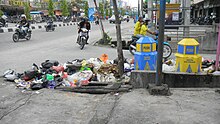Waste bank
A drop Bank (Engl. Waste bank or garbage Bank ) is a waste collection station where recyclable are purchased components of (mostly non-organic) household waste for recycling or exchanged for new products. Waste banks are mostly operated in emerging countries in various commercial, sometimes also cooperative forms. They pursue different business models , provided that they do not have a purely educational function and are therefore subsidized. Often they involve local actors, educational institutions or the media in their business model. They also serve community empowerment .
For non-commercial, e.g. B. municipal collection, exchange and redistribution points for old material or commercial initiatives to resell usable waste materials are called waste exchanges .
functionality
Private individuals can hand in recyclable waste that is as pure as possible in the waste banks and for it money or z. B. Get food. The waste is resold to re-users by the waste banks, which themselves do not have to have complex sorting facilities, but only temporary storage facilities. Overall, the amount of residual waste can be reduced. In particular, the capital-saving concept in comparison to central waste collection systems aims to reduce the unregulated disposal of paper and plastic waste in urban regions and in the sea, and to avoid waste incineration. At the same time, the model provides many people in a neighborhood with an additional income or is used to build up savings. The bank retains around 15 percent of the proceeds to cover its costs.
Examples
Indonesia

In Indonesia , the Ministry of Environment's first waste bank initiative was founded in 2008 in a small village near the city of Yogyakarta . Since then, the number of waste banks ( Bank sampah ) has risen to 3,000. The greatest possible decentralization is sought. The “savers” can be registered individually and receive their remuneration ( cash for trash ) paid out monthly or accumulate them in the form of savings. Each bank should only have a maximum of 1000 savers; In 2014, in Surabaya's largest waste bank, they achieved around € 50 credit per person per month - however, a maximum of € 5 is normal. In 2015, the system was already recycling 14 percent of Indonesia's non-organic waste. Organic waste is also occasionally collected according to this principle, for example on small islands that are visited by recyclers' boats. Unilever claims to have founded 3,000 waste banks in Indonesia that offer recycling options for plastic waste from 400,000 people.
Another variant of the waste bank is based on the Islamic principle of Sadaqa (Indonesian: shodaqoh ). The proceeds of the waste collection are returned to the village community and used for village projects.
Other countries
In China there are waste banks z. B. in schools, residential areas or tourist restaurants. Schoolchildren can, for example, collect their paper and plastic waste and exchange them for new stationery. The main aim of these waste banks is to promote environmental awareness.
In large residential complexes with large amounts of waste, waste banks could possibly even pick up recyclable waste through pick-up services, make payments for it, and still operate profitably. In India there are private garbage collection services for high-rise estates that weigh recyclable waste on site and pay for it immediately.
In Brazil there are collection points at the retail chain Grupo Pão de Açúca .
A forerunner of the waste banks was z. B. the SERO system in the GDR , in which reusable waste materials were bought up in numerous secondary raw material collection points and put to further use. The system achieved a high degree of recycling of valuable materials in the economic cycle; it still exists today in parts of Brandenburg in the form of raw material collection points.
literature
- Dyah Retno Wijayantia, Sri Suryani: Waste Bank as Community-based Environmental Governance: A Lesson Learned from Surabaya. 5th Arte Polis International Conference and Workshop. In: “Reflections on Creativity: Public Engagement and The Making of Place”, Arte-Polis, vol. 5, pp. 171–180, Bandung, August 2014.
Web links
- Why Waste Bank is Important for Communities , in: eco-bali.com, July 13, 2018 (English)
Individual evidence
- ↑ Dyah Retno Wijayantia, Sri Suryani, 2014.
- ↑ Dyah Retno Wijayantia, Sri Suryani, 2014.
- ↑ Waste Banks , in: temesirecycling.com, undated (accessed July 22, 2019)
- ↑ Garbage project on the Banda Islands , in: bandasea.org, undated (accessed July 22, 2019)
- ↑ Unilever Announces Ambitious Commitment to a Waste Free World on prnewswire.com on October 6, 2019.
- ^ Willi Germund: "Waste means money" , in: St. Galler Tagblatt , February 9, 2016.
- ^ "Waste banks" for more environmental awareness on german.china, org.cn, 23 November 2017.